How play makes hospital less traumatic for children
Play is how children learn to navigate the world, create relationships, manage their emotions and cope with stressful situations.
There aren't many experiences more stressful than being ill and receiving treatment in hospital yet many do not offer much in the way of play, despite this being a government requirement.
Why is it so important?

Like many six-year-olds, Afonso is focused on building a toy track. Unlike many of his peers, he's trying to construct it in a hospital.
When he was three, he was diagnosed with acute lymphoblastic leukaemia, a treatable cancer which demands hospital visits for treatments such as chemotherapy as well as lots of blood tests.
"I remember the first period of treatment, which was horrendous," his mother, Susana Casanova, recalls.
When he was having his first cannula - a tube which administers treatments - inserted, Susana remembers holding him as he was telling her: "Mummy, how do you allow them to hurt me so much?"
Now, a couple of years and many treatments later, he is not fazed.
"He is not traumatised by the word 'hospital', or doctors or nurses or procedures or lumbar punctures. He's not scared of that," Susana says. "Last year in school, he made a show and tell of going in an ambulance."
She believes the difference is down to play specialists, experts who entertain Afonso and play with him to support him through his treatments.
"The play is really amazing and it makes children forget they are in the hospital; the playmates put children in their natural environment," Susana says.
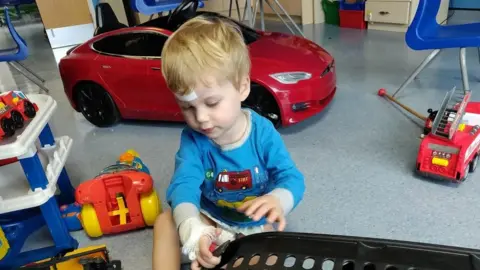 Rebecca Vowells
Rebecca VowellsJulie Morris, one of Afonso's "playmates" at Kingston Hospital in south-west London, says it "involves creating an environment for children that's not clinical".
"They (children) often ask for one of us to be with them when they have a scan or a blood test. It makes them feel a little bit more reassured, having somebody there.
"Sometimes they even look forward to coming in to see us and play in the playroom as well, which is nice.
"We can distract them when they have procedures, we can explain about the procedures - we're with them the whole time."
For Afonso's mother, the specialists weren't just there for her son, but her as well.
"Twenty-four hours in hospital, it's too intense," she says.
"They've always been super-protective, providing the coffee when I needed, playing with him so I could have a shower to keep going.
"They come and help us in every way they can, making them feel happy and that's the main thing that we want, to see our son happy, and be taken care of."
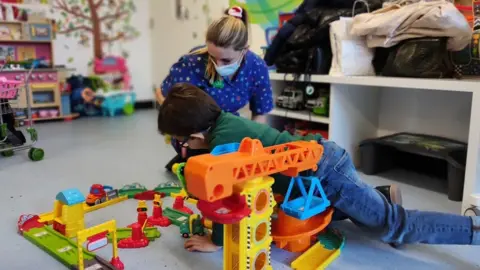
One mother, who recently spent more than 20 hours in A&E with her one-year-old, described it as a really tough experience as no play options were available.
"When children go into hospital, they're traumatised, they're afraid, they're anxious, and play is the natural choice for children to feel back in control," says Cathy Gilman, chief executive of Starlight Children's Foundation, a charity which provides toys to hospitals.
"It's so important a child isn't lonely or bored in hospital because that's a dangerous place where your mind and your imagination run riot."
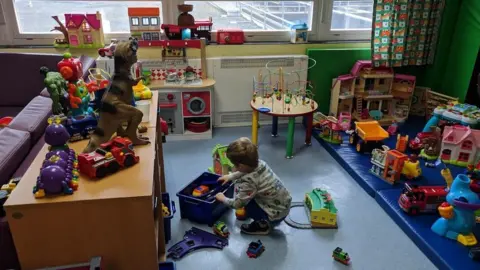
Play specialists can also help children process difficult emotions.
Children tend to "puddle jump" with their feelings - one minute they can be very sad, the next singing and dancing - says play therapist Donna Ellis.
This can be hard for children, especially if they think their actions are affecting their parents.
"They're very influenced by the mood and the atmosphere around them," she says.
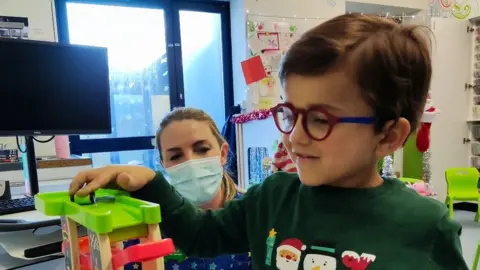
"If children start to think they can't talk about things or notice that it's upsetting adults, they can then learn they've got to adapt their own behaviours.
"As adults, we're quite guilty of persuading children out of feeling states. When they're upset, we'll say 'oh, cheer up, never mind' or 'it's OK'.
"Feelings come and go. If you talk with children about feelings being like waves, and the wave comes, it feels a bit bumpy or a bit scary or a bit rocky, but the seas move over."
'Difficult conversations'
One of the benefits of having a play specialist or therapist on hand is that they do not have the same emotional investment in a child as the parents.
"Although I am emotionally connected to them, they're not my children, so we can have difficult conversations, children can say things to me," adds Ms Ellis.
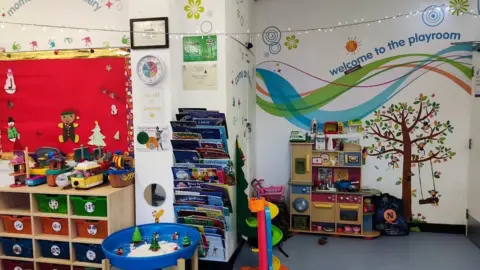
It's a service not available to every child.
According to the National Association of Healthcare Specialists, 80% of hospitals say their play services are limited.
Many have not recovered the service they offered before the pandemic when play areas were closed for infection control and play specialists were redeployed.
But even before the pandemic, access to play support was far from universal, according to Ms Gilman, who says 80% of hospitals that use Starlight's services have no budget for play and, of those that do, it's less than £500 a year.
In 2004, the government's national framework for children, young people and maternity services set out a requirement for play services to be available in all hospital settings, citing research that showed play "hastened recovery, as well as reduced the need for interventions to be delivered under general anaesthesia".
In a statement, the NHS said it recognised the importance of children's play services and was working closely with the Starlight Children's Foundation on increasing their availability.
"We have introduced a new taskforce and will be creating guidance for local areas to help them increase access and improve the quality of these services across hospitals in England, in line with NICE guidance," it added.
One service Starlight offers is boxes containing toys and other things for children to play with. Each one costs about £100 and can support 60 children.
The charity is also running a Christmas appeal, called Play Loneliness Away, to raise £400,000 to make sure children have access to toys and technology such as computer consoles.
Although NHS budgets are stretched, play can help make treatments go more smoothly which helps nurses and saves money in the long run, Ms Gilman says.
"If a child is less distressed then they can be treated more easily. So that preparation before with play, distraction during treatment and when you're bored afterwards is really important."

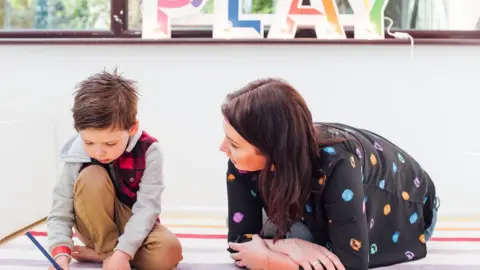 PlayHOORAY!
PlayHOORAY!The power of play
Claire Russell, early years expert and founder of PlayHOORAY!
Play can offer an amazing insight into how your child thinks and feels. When a child is processing complex emotional issues, it can very often show up in their play.
For example, if a child hears adults arguing, they may recreate this conflict with their teddies.
Make-believe play can help prepare children for the unknown and ease worry and anxiety in the process.
As children get older their play changes so then it is about finding new ways to "play".
Dancing or singing loudly can be seen as play too. Research shows these activities will get the endorphins going, which can actually reduce stress levels and be a factor in warding off anxiety and depression.
It's important that people know that they don't need to spend money on toys or equipment to entertain a child - I promise you can have just as much fun with everyday items around the house.
Spending time with your child and being silly with them, whatever their age, will remind them they are valued and loved, and laughing together is a wonderful medicine.

Follow BBC London on Facebook, Twitter and Instagram. Send your story ideas to [email protected]
